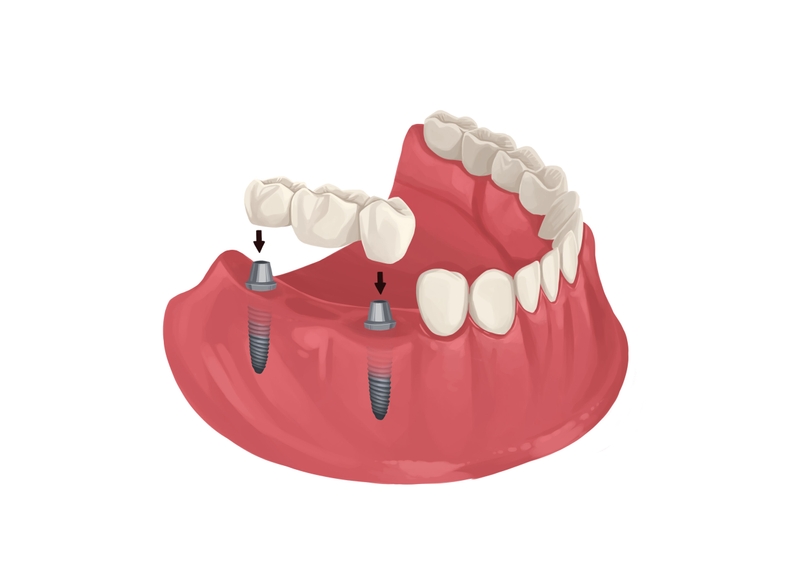- Medicaid does not cover the costs of dental implants for adults.
- Children on Medicaid are eligible for EPSDT (Early and Periodic Screening, Diagnostic and Treatment) benefits. This plan may cover a portion of the cost of dental implants.
- In rare cases, patients may get approval for a dental implant. Other low-cost alternatives are dental savings plans and dental schools.
The solution to a beautiful smile is within your reach. Use Authority Dental to book highly-rated dental implant specialists in your area. It's easy, fast, and trustworthy.
Looking for ways to cover the costs of your dental implants using Medicaid? Here's everything you need to know.
Medicaid coverage for dental implants

Picture by Authority Dental under CC 2.0 license
Dental implant costs are typically not covered for adults on Medicaid. The program is designed to provide basic healthcare needs, and implants are often considered cosmetic, or at least not detrimental to a person’s health.
EPSDT benefits
Early and Periodic Screening, Diagnostic and Treatment (EPSDT) are the benefits that children on Medicaid are entitled to. This includes children up to 21 years of age. If someone under that age requires dental implants, the program will often pay a portion of the cost, though never the full cost.
Special consideration
If a patient can demonstrate a significant, documented medical need for a dental implant, they may be able to have the procedure approved. The treating dentist and physician must complete the paperwork and include a narrative explaining why dental implants are the only option to correct the dentition.
They will also need to provide supporting documentation, such as X-rays, images, and a detailed treatment plan. Even after all this work, the program will still likely deny coverage for implants.

Alternatives to Medicaid dental implants coverage

Picture by Authority Dental under CC 2.0 license
Fortunately, there are other options to make dental implants more affordable.
Dental implant insurance
Dental insurance can be purchased as an individual or family plan. You can enroll directly through a private insurance company or through the Affordable Care Act (ACA) Marketplace. You will need to pay close attention to the implant coverage included in the plan. Some plans do not include benefits for them, and others have strict requirements on when they are allowed. Also, keep in mind that there are annual limits on what a plan will pay, and implants often fall outside those limits.
Dental savings plans
Private companies also offer dental discount plans, and they are a great way to get reduced fees on services. In exchange for a premium, you will have discounted prices on all of your dental services, not just implants. Outside of enrolling in a discount plan, your dentist may offer discounts for prepaying for services or for using cash instead of a credit card.
Dental schools
If you live near a dental school, you can schedule an appointment with a dental student who places implants. More knowledgeable dental providers supervise them, so you can rest assured your treatment will be done correctly. Since they are students and the appointments are often longer, they offer their patients significant discounts on treatment.
Lee admits: "This reality shifts our focus from 'how to get it covered' to 'how to make it affordable.' I often guide patients toward options like dental schools, which offer high-quality care supervised by experts at significantly reduced costs."
"We recognize that while Medicaid will not pay for the best solution, securing a stable, long-term fix, such as an implant, is ultimately a crucial investment in a patient's overall health and quality of life," he adds.
FAQ
Why doesn’t Medicaid typically cover dental implants?
Medicaid is designed to provide basic healthcare needs to low-income people. Implants are not considered a basic need, as there are other, more affordable options for replacing missing teeth. If the Medicaid program were to include implants in its benefits, a large amount of funds would need to be diverted from other program areas.
Is Medicaid dental implant coverage the same in all states?
Generally speaking, yes, Medicaid’s dental implant coverage is the same nationwide. However, there are significant differences in the types of dental coverage available to adults across states. Check your state resources to learn more about what benefits are available in your state.
Harry Lee, DMD
The question, "Does Medicaid pay for dental implants?" is one of the most disheartening I have to answer in my office because, for the vast majority of adults, the direct answer is no. Medicaid is designed to cover essential medical needs, and unfortunately, implants are almost universally deemed "elective" or "cosmetic" by state programs. This forces many patients who desperately need a stable replacement for health reasons to explore cheaper, less effective alternatives, such as partial dentures.